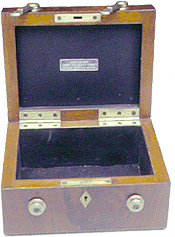
In September 1856, the French Government persuaded France's celebrated magician Jean-Eugne Robert-Houdin, "the father of modern magic," to come out of retirement and help suppress tribal revolutions against the French colonial government in Algeria.
France wanted a magician because the revolts were being led by magicians -- marabouts, "holy men" who used fakir tricks (glass eating, fire walking, snake charming) to build credibility as prophets of Allah. Their authority established, the marabouts would then inflame their followers to drive out the godless French. Houdin's mission was to outmagic the marabouts and discredit them.
On Oct. 28, 60 burnoose-clad chieftains and their retinues arrived at Algiers's Bab Azoun Theater to see Houdin. The magician began with a few pleasant surprises: he produced cannonballs and bouquets from a hat; he threw coins into the air, which then appeared in a crystal box suspended above the audience; he filled an empty silver punch bowl with steaming coffee -- a great hit with the Arab java lovers.
Having tantalized the audience with humor, Houdin began the psychological assault. He brought out a strongbox with a ring for a handle, and placed it on the floor. He asked for a muscular volunteer to come up onstage and lift the chest. A volunteer, a particularly burly man, did so easily.
Then Houdin waved his wand at the volunteer and said, "Voila! You are weaker than a woman; now, try to lift the box." With a disdainful swagger, the volunteer seized the handle again, but though he sweated and strained, though his compatriots cheered him on, he could not move the chest. After a few minutes he suddenly screamed, fell to his knees, tore his hands from the ring and fled, crying for Allah to save him.
Houdin followed this trick by catching a marked bullet in an apple, and by making a member of the audience vanish. By the end of the show, the chieftains were exclaiming, "Shaitan!" (the Arabic equivalent of "Satan") as they ran for the exits in terror.But Houdin was a magician, not a politician, so he had a conscience. After the show he sent translators to explain to the spectators that his tricks were just like the tricks of the marabouts -- theater and science, not the supernatural. (A powerful electromagnet under the stage kept the box on the ground; an electrical shock sent the strongman running.) In this case, a magician revealing his tricks paid off. Three days after the performance, 30 of the most powerful chieftains presented Houdin with an illuminated manuscript praising his art and pledging th